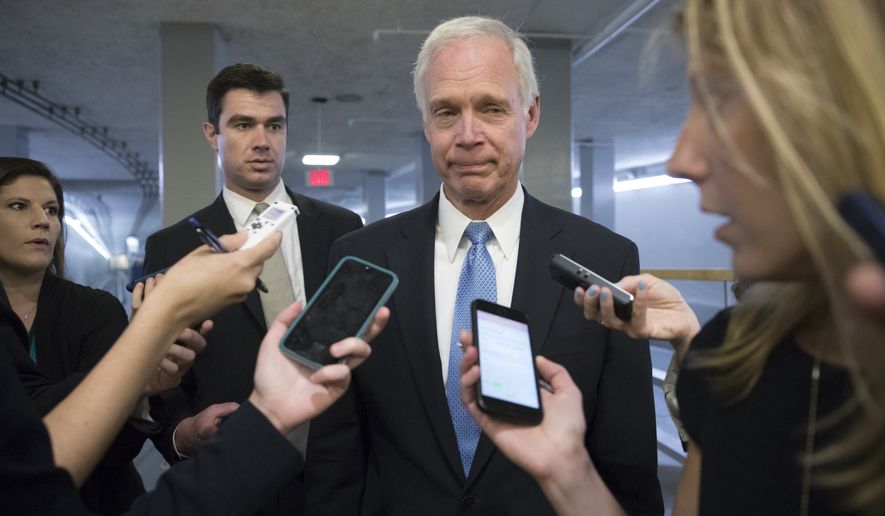A key senator said Wednesday that the official “score” of the GOP health bill is flawed because it uses outdated estimates for how many people were going to get insurance under Obamacare — making suspect any comparison to the new bill.
Sen. Ron Johnson, Wisconsin Republican, said the Congressional Budget Office hasn’t updated its baseline for Obamacare enrollment since March 2016, when health care markets were just beginning to show instability, far from the collapse he and other Republicans say is now happening.
His complaint is just the latest in a string of questions aimed at the CBO, whose dire predictions have severely dented the political prospects for a Republican Obamacare repeal bill.
The CBO says the Senate bill that was supposed to be taken up this week would leave 22 million fewer people with insurance in a decade, and would increase costs for older and sicker customers, though younger and healthier customers would pay far less in premiums.
Faced with those numbers, at least nine Senate Republicans had said they couldn’t vote for the GOP bill — forcing leaders to shelve it and try to write a new version.
At the same time, Republicans have tried to argue with the referee, saying CBO has a bad track record when it comes to making health projections.
The White House said the CBO has “consistently proven it cannot accurately predict how health care legislation will impact insurance coverage.”
While all experts agree that the CBO is the “gold standard” when it comes to predicting outcomes of major legislation like health care, they also stipulate that behavioral outcomes are often unpredictable.
Stan Veuger, a health policy scholar at the American Enterprise Institute, said, “The more state variation, the more political forecasts the CBO has to make. Their guess is as good as yours or mine — except for asking experts what they believe will happen based on past data.”
Sen. James E. Risch, Idaho Republican, said that’s exactly the problem with the GOP bill.
“Scoring on this bill is impossible in some instances. Scoring is done based upon models to which [are] plugged in historical information. We are plowing ground that has never been plowed,” he said.
Much of the difference in the number of insured under Obamacare versus the GOP bill comes down to how many people will remain enrolled in Medicaid, the federal-state partnership program that provides health coverage to the poor.
Republicans say the CBO projects that people will voluntarily give up Medicaid even if they still qualify — a prediction that they said makes no sense.
Critics say the CBO got it wrong in the past on Obamacare. Originally the scorekeeper said 23 million people would get their insurance through the health law’s exchanges by 2016. The actual number was 10.4 million people as of early 2016, according to the Centers for Medicare & Medicaid Services.
“Exchange enrollment is roughly half of what they predicted it would be. The effect of the individual mandate on people’s behavior does not appear to be as large as they assumed,” said Michael Cannon, who studies health policy at the Cato Institute.
He said the CBO misunderstood how people would respond to Obamacare’s individual mandate. He said the analysts also underestimated how many people would enroll in Medicaid because states made a more concerted effort to sign people up for the program.
Medicaid expansion is the area of most uncertainty in the Republican health care score, say experts, since it tries to predict how states will behave post-expansion.
Matthew Fiedler, a health policy scholar at the Brookings Institute, said that the CBO assumes no state that has not already expanded their program will expand with the Republican bill, and that some states that have expanded might scale back their program.
But he said there’s also a few states that might want to keep their Medicaid program but can’t with the reduction in the federal match.
He did say that in scoring the Republican bill, the CBO is at a greater advantage than in the past since they have the fresh data from Obamacare’s implementation.
The CBO has also missed the mark on cost estimates for other programs. It projected the 2003 Medicare prescription drug law would cost some $400 billion over a decade, but the actual cost came in at about half of that.
CBO analysts released a report in 2014 saying it overestimated enrollment and also projected national prescription drug spending would rise faster than it did.
Mr. Johnson, meanwhile, says the CBO is using the wrong baseline to judge changes from the GOP’s latest bill.
“That’s using a baseline from March of 2016, when those markets were unstable but nowhere near where they are today. The most recent CBO baseline we have, as of January 2017, which was not being used, on the individual market, there’s no difference,” Mr. Johnson said on MSNBC.
The CBO said that they made the decision to use the baseline in consultation with the budget committees on Capitol Hill and the Joint Committee on Taxation, and said it was just going by the most recent budget produced by Congress.
“That approach is not unusual: The budgetary effects of reconciliation legislation are typically estimated relative to the baseline that underlies the budget resolution that specified the reconciliation instructions, and that was the basis for the deficit reduction goals stated in the resolution,” the agency said. “The March 2016 baseline has been used by CBO and JCT for cost estimates for all pieces of legislation related to the budget reconciliation process for 2017, including this one.”
• Sally Persons can be reached at spersons@washingtontimes.com.




Please read our comment policy before commenting.